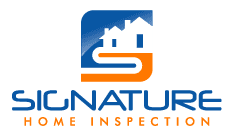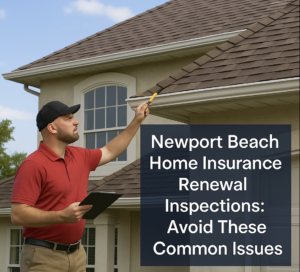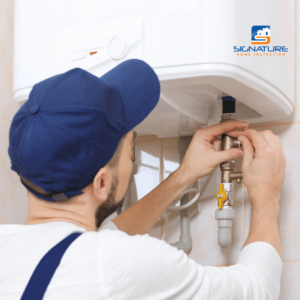Buying a Home with a Precast Concrete Chimney? Here’s What You Need to Know
If you’re buying a home in Southern California, you may come across one with a precast concrete chimney—a feature common in homes built from the 1970s through the early 2000s. These chimneys were marketed as durable and affordable alternatives to masonry fireplaces. But over the years, many have developed serious structural and safety issues.

Informational graphic warning homebuyers about potential structural and safety issues with precast concrete chimneys like Rampart General and Superior.
At Signature Home Inspection, we’ve inspected hundreds of these chimney systems throughout Orange County, Los Angeles, and surrounding areas. If you’re considering a home with a precast chimney, here’s what you need to know before you buy.
What Is a Precast Concrete Chimney?
Precast concrete chimneys (also known as modular masonry chimneys or factory-built concrete fireplaces) are made from concrete cast in molds at a factory and assembled on-site. These systems were designed to resemble traditional brick or block chimneys, but cost significantly less and can be installed more quickly.
The most common brands included:
-
Rampart General
-
Superior
-
Marco
-
Majestic
-
Martin
-
Heatform
These chimneys were typically installed in tract homes, townhomes, and suburban developments between 1970 and the early 2000s.
Why Are Precast Concrete Chimneys a Problem?
Although precast chimneys were considered innovative at the time, many have aged poorly, and some pose serious fire or collapse hazards today.
Common issues include:
-
Cracking: Expansion and contraction, poor design, or shifting can cause major cracks in the chimney crown, cap, firebox, or flue.
-
Spalling: The outer layer of concrete flakes or crumbles due to moisture intrusion and freeze-thaw cycles.
-
Corroded Steel Reinforcement: Many of these systems utilized internal steel rebar, which rusts and expands when exposed to water, causing the concrete to break apart from within.
-
Flue Joint Separation: Misaligned or deteriorated flue sections can allow heat and smoke to escape into combustible framing.
-
Smoke and Water Staining: Water damage, backdrafting, and leaking flue joints can cause visible staining and odor inside the home.
Rampart General chimneys are particularly problematic. Many have failed structurally, and the manufacturer is no longer in business, which means replacement parts are not available. This often requires a full chimney tear-down and rebuild.
When Were These Chimneys Installed?
Precast chimneys were most commonly installed from the 1970s through the early 2000s, especially in areas where traditional masonry was cost-prohibitive. They were heavily used in subdivisions throughout Southern California, making them a frequent concern during resale transactions today.
What to Look for When Buying a Home with a Precast Chimney
If you’re buying a home that appears to have one of these chimney systems, take these steps immediately:
1. Ask the Right Questions
-
What brand/model is the chimney system?
-
Has the chimney been inspected recently?
-
Are there visible cracks, staining, or past repairs?
2. Get a Specialized Chimney Inspection
At Signature Home Inspection, we provide detailed fireplace and chimney evaluations. If red flags are noted, we recommend a Level II chimney inspection with a certified chimney professional, which includes:
-
A flue video scan
-
Inspection of the firebox, crown, and smoke chamber
-
Identification of cracks, separation, or unsafe construction
3. Watch for These Red Flags
-
Visible cracking at the top or sides of the chimney
-
Rust stains on the exterior (suggests internal corrosion)
-
Leaning or shifting structure
-
Smoke stains around the firebox
-
Cracked or displaced interior firebrick panels
-
Gaps in the flue liner or missing mortar
Can Precast Chimneys Be Repaired?
Repairs are possible, but they can be costly, and sometimes full replacement is the only safe solution.
Typical repair options include:
-
Applying chimney crown coatings or sealers to prevent water intrusion
-
Installing a new stainless steel flue liner
-
Removing and rebuilding damaged sections
-
In severe cases, full chimney tear-down and rebuild (often $10,000–$25,000 or more)
Because many manufacturers, such as Rampart General, no longer exist, finding compatible replacement parts is often impossible, requiring either creative or comprehensive repairs.
Insurance and Safety Considerations
Insurance companies are increasingly aware of the risks associated with precast chimney systems. Some now require inspection documentation or even chimney liner upgrades before they’ll issue a policy.
In real estate transactions, these chimneys can complicate escrow or lead to last-minute price renegotiations, especially when costly structural damage is uncovered during the inspection.
Final Advice for Homebuyers
If the home you’re buying has a precast concrete chimney, don’t skip the inspection—and don’t assume everything is fine because it “looks solid.”
Here’s what to do:
-
Hire an experienced inspector familiar with precast chimney systems
-
Request a chimney specialist if any damage is noted
-
Use inspection findings to negotiate with the seller
-
Budget for potential repairs or replacements before closing
Trust Signature Home Inspection to Spot the Problems Early
We’ve been inspecting homes with precast chimney systems for over 20 years and know exactly what to look for. Our comprehensive reports provide you with peace of mind and leverage during negotiations, ensuring you don’t end up with a costly surprise after the sale.
Call us today at 888-860-2688
Schedule your inspection online at https://www.signaturemore.com/schedule-inspection/
Sources:
-
National Fire Protection Association (NFPA 211)
-
Chimney Safety Institute of America (CSIA)
-
InterNACHI Precast Chimney Inspection Guide
-
Journal of Light Construction: “Precast Fireplaces and Chimneys”
-
Building Performance Institute: “Chimney Failures and Fire Hazards”









